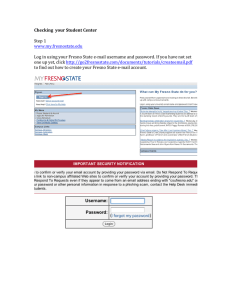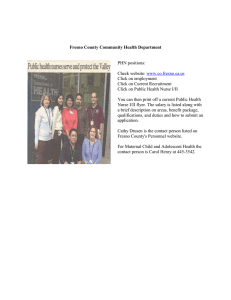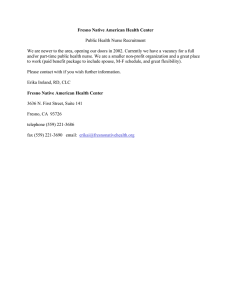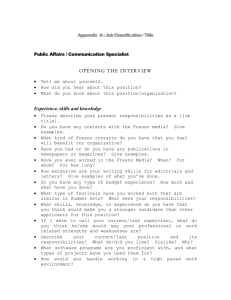Archived Seminars 2014/15
advertisement
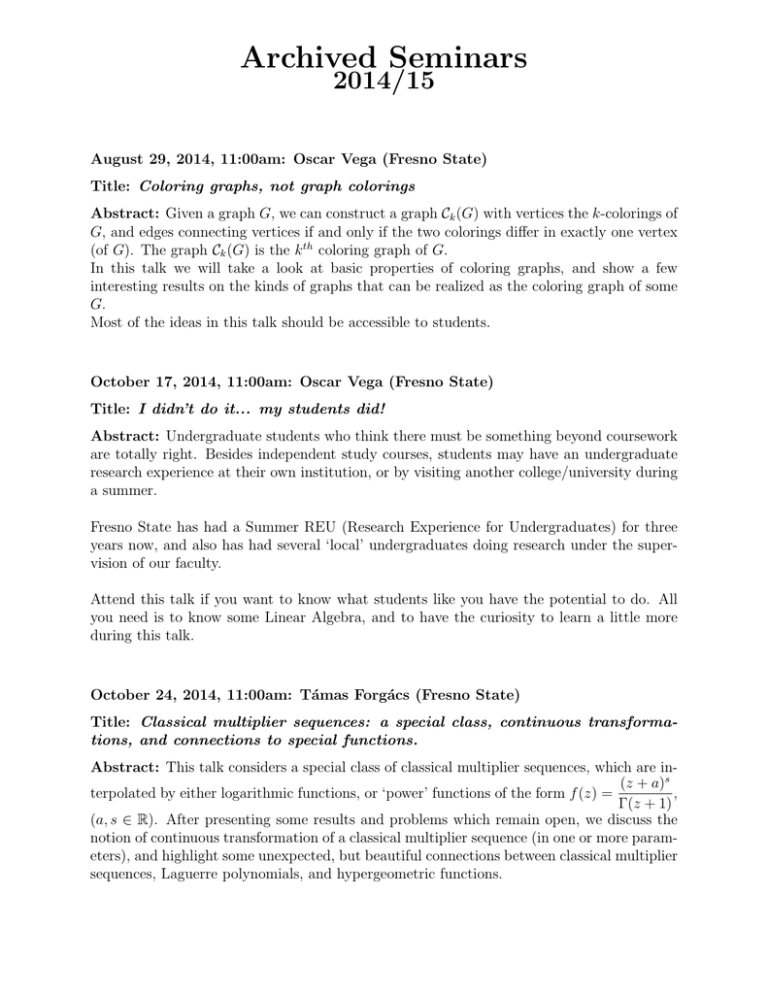
Archived Seminars 2014/15 August 29, 2014, 11:00am: Oscar Vega (Fresno State) Title: Coloring graphs, not graph colorings Abstract: Given a graph G, we can construct a graph Ck (G) with vertices the k-colorings of G, and edges connecting vertices if and only if the two colorings differ in exactly one vertex (of G). The graph Ck (G) is the k th coloring graph of G. In this talk we will take a look at basic properties of coloring graphs, and show a few interesting results on the kinds of graphs that can be realized as the coloring graph of some G. Most of the ideas in this talk should be accessible to students. October 17, 2014, 11:00am: Oscar Vega (Fresno State) Title: I didn’t do it... my students did! Abstract: Undergraduate students who think there must be something beyond coursework are totally right. Besides independent study courses, students may have an undergraduate research experience at their own institution, or by visiting another college/university during a summer. Fresno State has had a Summer REU (Research Experience for Undergraduates) for three years now, and also has had several ‘local’ undergraduates doing research under the supervision of our faculty. Attend this talk if you want to know what students like you have the potential to do. All you need is to know some Linear Algebra, and to have the curiosity to learn a little more during this talk. October 24, 2014, 11:00am: Támas Forgács (Fresno State) Title: Classical multiplier sequences: a special class, continuous transformations, and connections to special functions. Abstract: This talk considers a special class of classical multiplier sequences, which are in(z + a)s , terpolated by either logarithmic functions, or ‘power’ functions of the form f (z) = Γ(z + 1) (a, s ∈ R). After presenting some results and problems which remain open, we discuss the notion of continuous transformation of a classical multiplier sequence (in one or more parameters), and highlight some unexpected, but beautiful connections between classical multiplier sequences, Laguerre polynomials, and hypergeometric functions. October 31, 2014, 11:00am: Támas Forgács (Fresno State) Title: The nonexistence of cubic Legendre multiplier sequences. Abstract: In this talk I will describe the work I did with three students in the Fresno State REU during the summer of 2013. We proved that there are no cubic polynomials which interpolate cubic Legendre multiplier sequences (LMS). In addition, we provided a new method to decide whether a given polynomial p(x) interpolates a LMS, and used it to reprove the fact that there are no linear LMS. I will discuss the current use of this newly developed method in a paper I am writing with A. Piotrowski and M. Chasse. November 7, 2014, 11:00am: Adnan Sabuwala (Fresno State) Title: MyMathLab: An Overview and More! Abstract: In this talk, I plan to demonstrate features of MyMathLab (MML) that would be useful for instructors. Most of us teach (or will teach) calculus using the Briggs/Cochran textbook which is complemented with this LMS. I will use both the first and second editions of this textbook to demonstrate these features and also answer as many questions or desired features that instructors have or would like to see in MML. This talk will be a live demonstration and it will help if you can bring your laptops with you. November 14, 2014, 11:00am: Doug Singleton (Fresno State) Title: The Time-Dependent Aharonov-Bohm Effect and Stokes’ Theorem Abstract: Stokes’ theorem is investigated in the context of the time-dependent AharonovBohm effect – the two-slit quantum interference experiment with a time varying solenoid between the slits. The time varying solenoid produces an electric field which leads to an additional phase shift which is found to exactly cancel the time-dependent part of the usual magnetic Aharonov-Bohm phase shift. This electric field arises from a combination of a non-single valued scalar potential and/or a 3-vector potential. The gauge transformation which leads to the scalar and 3-vector potentials for the electric field is non-single valued. This feature is connected with the non-simply connected topology of the Aharonov-Bohm set-up. The non-single valued nature of the gauge transformation function has interesting consequences for the 4-dimensional Stokes’ theorem for the time-dependent Aharonov-Bohm effect. An experimental test of these conclusions is proposed. November 21, 2014, 11:00am: Carmen Caprau (Fresno State) Title: The Kauffman bracket for singular links Abstract: A singular link is an immersion of a disjoint union of circles into the threedimensional space that admits only finitely many singularities that are all transverse double points. In this talk, I will introduce a polynomial invariant for singular links. Specifically, I will provide two approaches (combinatorial and algebraic) to a version of the Kauffman bracket polynomial for singular links. If time permits, I will finish with a brief discussion of the corresponding polynomial for virtual singular links. This talk should be accessible to students. In fact, it reflect work done by some of my former research students. December 05, 2014, 11:00am: Marat Markin (Fresno State) Title: On an Abstract Evolution Equation with a Normal Operator: Weak Solutions and Their Differentiability Abstract: We shall see that the use of the well-known exponential formula y(t) = etA f can be naturally extended to the case of a normal operator A in a complex Hilbert space H to describe generalized (weak) solutions of the evolution equation y 0 (t) = Ay(t), t ≥ 0. We are also going to outline proofs of conditions necessary and sufficient for the weak solutions, which a priori need not be differentiable, to be infinite differentiable on [0, ∞) or (0, ∞) and observe certain interesting effects of their smoothness improvement. The talk represents a characteristic segment of the reporter’s research.

